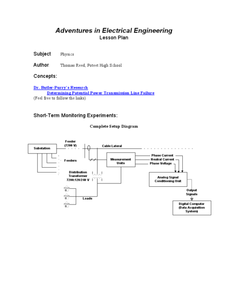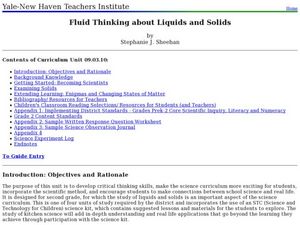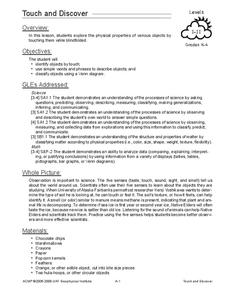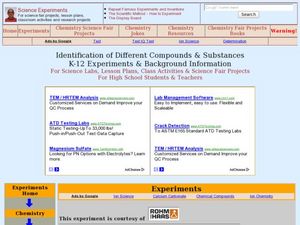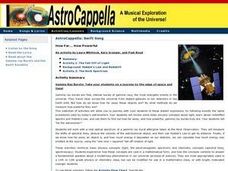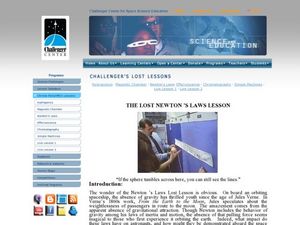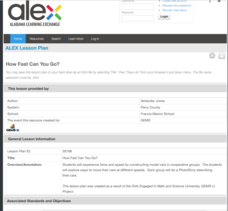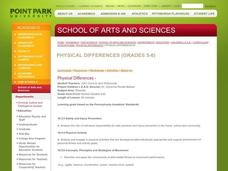Curated OER
Properties of Matter (Biomaterial Through Nanotechnology)
Students investigate friction between different surfaces. In this physics lesson, students research biomaterials that can reduce friction. They calculate efficiency using a mathematical formula.
Curated OER
The Solar System
Third graders investigate Newton's law of Motion. In this chemical reaction lesson, 3rd graders participate in an experiment with rockets to study Newton's law. Students observe the effects of a chemical reaction made by combining...
Curated OER
Adventures in Electrical Engineering
Students explore electricity by conducting a series of experiments. In this physics lesson plan, students discover the relationship between current, voltage and resistance. They calculate voltage and power in a given system.
Curated OER
Fluid Thinking About Liquids and Solids
Second graders examine the physical characteristics of the different states of matter. In this chemistry lesson, 2nd graders observe how matter changes from one phase to another. They classify substances according to its type of matter.
Curated OER
Touch and Discover
Students identify the physical properties of items using the sense of touch. In this touch and discover instructional activity, students describe items. Students sort items using a Venn diagram.
Curated OER
An Introduction to Sensors
Students research the International System (SI) of units of measurements. They make measurements using the metric system. They study key concepts used in building and use of sensors, how sensors work and their role in measuring...
Curated OER
Galileo: His Times & Beliefs
Learners study Galileo and his scientific discoveries. They complete a series of experiments/model constructions, using 17th century equipment and procedures, to "recreate," demonstrate and explore the various discoveries of Galileo.
Curated OER
Magnetorheological Fluids
Young scholars conduct a series of experiments on magnetorheological fluids. In this physics instructional activity, students explain how these fluids behave in varying magnetic field strength. They give practical applications of...
Curated OER
Identification of Different Compounds and Substances
Students conduct a series of tests to identify unknown compounds. For this chemistry lesson, students compare the physical and chemical properties of substances. They collect data and formulate a conclusion.
Curated OER
Build a 3-d Plant Model
Third graders construct a three-dimensional model of a flowering plant. They examine the major plant parts and their basic functions. They demonstrate an understanding of the similarities and differences in the physical...
Curated OER
Art and Anatomy: The Vitruvian Teen
Twelfth graders create an artistic version of a Vetruvian teen. In this anatomy lesson, 12th graders design an experiment to test the theory of the ideally proportioned man. They present their findings in class.
Curated OER
Freeze Pops
Students experience problem-based learning as they use prior knowledge of the states of matter to keep a frozen juice bar from melting.
Curated OER
Environment: The River Classroom
Seventh graders engage in hands-on experiments and activities dealing with rivers and greenways. They also observe lectures and demonstrations by experts in water and river restoration. Students and teachers participate in canoe trips...
Curated OER
How Far... How Powerfu
Young scholars work with a real optical spectrum of a gamma ray burst afterglow taken at the Keck Observatory. They measure the shifts of spectral lines, deduce the velocity of the astronomical object, and then use Hubble's Law to get...
Curated OER
The Lost Newton's Laws Lesson
Students explore momentum. In this physics lesson, students perform an experiment in which two balls are released on slanted boards while students observe which ball will go the farthest and the fastest. Students define and explain...
Alabama Learning Exchange
How Fast Can You Go?
Learners investigate force and speed. In this physics instructional activity, students construct model cars in small groups and perform experiments to identify what factors influence speed and force.
Curated OER
Diversity
Students access prior knowledge of the five senses and relate to students with disabilities. In this people with disabilities lesson, students research and use a Venn diagram to compare and contrast famous people and their...
Curated OER
Hawaiian Bird Beak Adaptation
Students explore adaptation by participating in a lab activity. For this bird characteristics lesson, students discuss the different purposes birds have for their beaks and conduct an experiment testing which beaks collect food best....
Curated OER
Changing States: Does it Matter
Students participate in experiments to visualize the differences between chemical and physical changes. They attempt to detect the five characteristics of a chemical change.
Curated OER
The Halls are Alive with the Sound of Music
Students discuss physical places in which had good or bad acoustics. After reading an article, they discover the relationship between the physics of sound and concert hall acoustics. They calculate the speed of sound and compare their...
Curated OER
The Dalton Model
For this Dalton worksheet, students read about John Dalton and his contributions to understanding the atom. Students are given sample data for Dalton's experiments and they answer questions about the data in his experiments.
Curated OER
Sitting on Nails-Boyle's Law
Students experience pressure as a force per unit area in this experiment with a board of nails. In this physics lesson, students discover Boyle's law as they perform experiments with pressure.
Curated OER
Exercise and Heartrate
Fourth graders experiment to find the effects of exercise on the heart rate. In this exercise and heart rate lesson, 4th graders create questions about exercise and heart rate. Students use the scientific method to test and analyze...
Curated OER
Frozen, Canned or Fresh?
Students compare spinach. In this Science lesson, students construct an experiment to test fresh, frozen, and canned spinach taste and texture. Students record their findings in charts and graphs.


